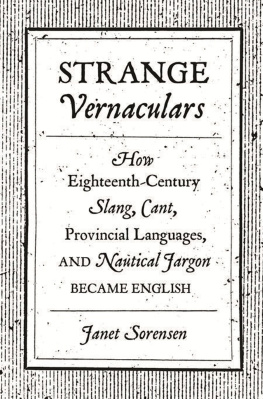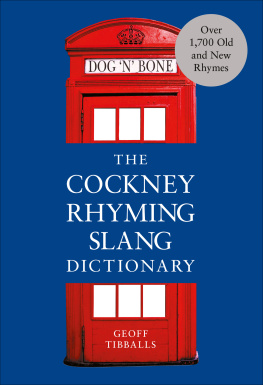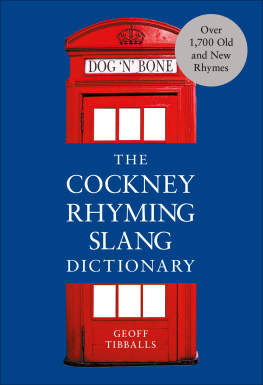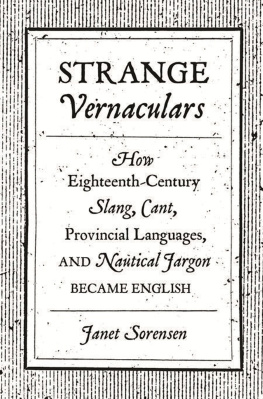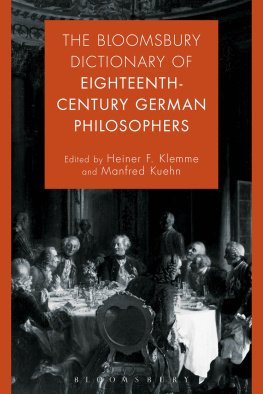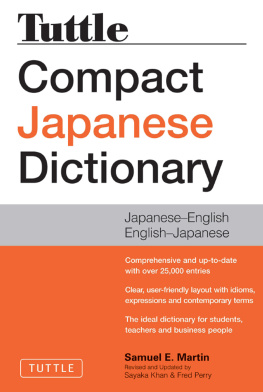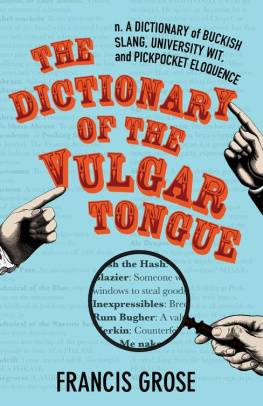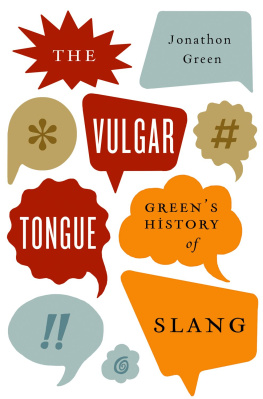Janet Sorensen - Strange Vernaculars: How Eighteenth-Century Slang, Cant, Provincial Languages, and Nautical Jargon Became English
Here you can read online Janet Sorensen - Strange Vernaculars: How Eighteenth-Century Slang, Cant, Provincial Languages, and Nautical Jargon Became English full text of the book (entire story) in english for free. Download pdf and epub, get meaning, cover and reviews about this ebook. year: 2017, publisher: Princeton University Press, genre: Home and family. Description of the work, (preface) as well as reviews are available. Best literature library LitArk.com created for fans of good reading and offers a wide selection of genres:
Romance novel
Science fiction
Adventure
Detective
Science
History
Home and family
Prose
Art
Politics
Computer
Non-fiction
Religion
Business
Children
Humor
Choose a favorite category and find really read worthwhile books. Enjoy immersion in the world of imagination, feel the emotions of the characters or learn something new for yourself, make an fascinating discovery.
- Book:Strange Vernaculars: How Eighteenth-Century Slang, Cant, Provincial Languages, and Nautical Jargon Became English
- Author:
- Publisher:Princeton University Press
- Genre:
- Year:2017
- Rating:4 / 5
- Favourites:Add to favourites
- Your mark:
Strange Vernaculars: How Eighteenth-Century Slang, Cant, Provincial Languages, and Nautical Jargon Became English: summary, description and annotation
We offer to read an annotation, description, summary or preface (depends on what the author of the book "Strange Vernaculars: How Eighteenth-Century Slang, Cant, Provincial Languages, and Nautical Jargon Became English" wrote himself). If you haven't found the necessary information about the book — write in the comments, we will try to find it.
How vocabularies once associated with outsiders became objects of fascination in eighteenth-century Britain
While eighteenth-century efforts to standardize the English language have long been studied--from Samuel Johnsons Dictionary to grammar and elocution books of the period--less well-known are the eras popular collections of odd slang, criminal argots, provincial dialects, and nautical jargon. Strange Vernaculars delves into how these published works presented the supposed lexicons of the common people and traces the ways that these languages, once shunned and associated with outsiders, became objects of fascination in printed glossaries--from The New Canting Dictionary to Francis Groses Classical Dictionary of the Vulgar Tongue--and in novels, poems, and songs, including works by Daniel Defoe, John Gay, Samuel Richardson, Robert Burns, and others.
Janet Sorensen argues that the recognition and recovery of outsider languages was part of a transition in the eighteenth century from an aristocratic, exclusive body politic to a British national community based on the rhetoric of inclusion and liberty, as well as the revaluing of a common British past. These representations of the vernacular made room for the common people within national culture, but only after representing their language as strange. Such strange and estranged languages, even or especially in their obscurity, came to be claimed as British, making for complex imaginings of the nation and those who composed it. Odd cant languages, witty slang phrases, provincial terms newly valued for their connection to British history, or nautical jargon repurposed for sentimental connections all toggle, in eighteenth-century jest books, novels, and poems, between the alluringly alien and familiarly British.
Shedding new light on the history of the English language, Strange Vernaculars explores how eighteenth-century British literature transformed the patois attributed to those on the margins into living symbols of the nation.
Examples of slang from Strange Vernaculars
- bum-boat woman: one who sells bread, cheese, greens, and liquor to sailors from a small boat alongside a ship
- collar day: execution day
- crewnting: groaning, like a grunting horse
- gentlemans companion: lice
- gingerbread-work: gilded carvings of a ships bow and stern
- luggs: ears
- mort: a large amount
- thraw: to argue hotly and loudly
Janet Sorensen: author's other books
Who wrote Strange Vernaculars: How Eighteenth-Century Slang, Cant, Provincial Languages, and Nautical Jargon Became English? Find out the surname, the name of the author of the book and a list of all author's works by series.

